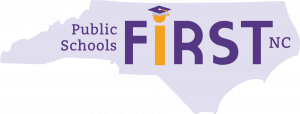North Carolina’s Taxpayer-Funded Private School Vouchers May Face Accountability Measures
North Carolina is spending millions each year on tax-payer funded private school vouchers, but currently requires no accountability for how the funds are spent.
RALEIGH, NC, UNITED STATES, April 24, 2025 /EINPresswire.com/ -- Budget discussions are heating up in North Carolina as the Senate just released its proposal and the House’s proposal is coming soon. In recent years, voucher policy has been embedded in budget bills, often taking language from stand-alone bills introduced earlier. This year, a handful of stand-alone bills show a clear push to bring needed transparency and accountability to the state’s voucher program. In particular, two voucher accountability bills—one introduced in each chamber—take steps to bring private schools that take school vouchers funded by public tax dollars closer to the level of accountability and transparency provided by public schools.Approximately 75% of North Carolina’s nearly 900 private schools are registered as direct-payment schools that are eligible to receive tuition voucher payments from the state. In 2024-25, the program became universal, meaning that any family, regardless of their income, level can receive a state-funded tuition subsidy. In addition, the requirement that the students receiving the vouchers have prior public school enrollment was dropped to allow all private school students to qualify.
As a result, applications and expenses soared. As of April 2025, taxpayer-funded tuition payments for the 2024-25 school year are more than three times what they were last year, with expenses to date topping $431 million this year alone.
The current state base budget for 2025-26 includes an appropriation of $731 million for the voucher programs, though lawmakers still have time to make changes.
Senate Bill 774 and House Bill 815 (1) change the language of current law to build in fiscal, safety, and academic standards for the private schools that accept taxpayer-funded tuition vouchers.
If the changes are made, private schools will be required to:
- hire licensed teachers for at least 50% of the teaching staff. Currently, private schools do not have to hire any licensed teachers or even college graduates.
- follow the local school district's policy of conducting criminal background checks on all staff. Currently only one staff member at a private school must pass a criminal background check.
- administer the same tests required by state law for students in grades three and higher.
- comply with the state standard course of study.
- conduct a financial audit. Schools receiving more than $250,000 in voucher funds must publish their expenditures in the state reporting system (Uniform Education Reporting System).
- maintain a student population that reasonably reflects the racial and ethnic composition of the general population residing within the local school district.
Private schools would also be prohibited from increasing tuition more than 5% in one year and they will receive tuition payments from the state on a monthly basis (changed from twice/year) to allow for students entering or leaving the schools.
When taxpayers are spending hundreds of millions annually in private school tuition payments, it makes good sense for private schools, just like public schools, to account for how those dollars are spent.
1. House Bill 815: https://www.ncleg.gov/BillLookUp/2025/hb%20815
Heather Koons
Public Schools First NC
email us here
Visit us on social media:
LinkedIn
Bluesky
Instagram
Facebook
YouTube
TikTok
Legal Disclaimer:
EIN Presswire provides this news content "as is" without warranty of any kind. We do not accept any responsibility or liability for the accuracy, content, images, videos, licenses, completeness, legality, or reliability of the information contained in this article. If you have any complaints or copyright issues related to this article, kindly contact the author above.
Physical Vapor Deposition Market to Reach USD 51.6 billion by 2035 | Fact.MR Report
Eric Malley Launches GTM 23: The Adaptive Growth System™
From Pioneer to Follower: Eric Malley’s Spherical Philosophy™ Exposes Why Apple’s AI Crossroads Signal a New Era
Kalendarium
Więcej ważnych informacji
 Jedynka Newserii
Jedynka Newserii

 Jedynka Newserii
Jedynka Newserii

Prawo

Trwają dyskusje nad kształtem unijnego budżetu na lata 2028–2034. Mogą być rozbieżności w kwestii Funduszu Spójności czy dopłat dla rolników
Trwają prace nad wieloletnimi unijnymi ramami finansowymi (WRF), które określą priorytety wydatków UE na lata 2028–2034. W maju Parlament Europejski przegłosował rezolucję w sprawie swojego stanowiska w tej sprawie. Postulaty europarlamentarzystów mają zostać uwzględnione we wniosku Komisji Europejskiej w sprawie WRF, który zostanie opublikowany w lipcu 2025 roku. Wciąż jednak nie ma zgody miedzy państwami członkowskimi, m.in. w zakresie Funduszu Spójności czy budżetu na rolnictwo.
Konsument
35 proc. gospodarstw domowych nie stać na zakup mieszkania nawet na kredyt. Pomóc może wsparcie budownictwa społecznego i uwolnienie gruntów pod zabudowę

W Polsce co roku oddaje się do użytku ok. 200 tys. mieszkań, co oznacza, że w ciągu dekady teoretycznie potrzeby mieszkaniowe społeczeństwa mogłyby zostać zaspokojone. Jednak większość lokali budują deweloperzy na sprzedaż, a 35 proc. gospodarstw domowych nie stać na zakup nawet za pomocą kredytu. Jednocześnie ta grupa zarabia za dużo, by korzystać z mieszkania socjalnego i komunalnego. Zdaniem prof. Bartłomieja Marony z UEK zmniejszeniu skali problemu zaradzić może wyłącznie większa skala budownictwa społecznego zamiast wspierania kolejnymi programami zaciągania kredytów.
Problemy społeczne
Hejt w sieci dotyka coraz więcej dzieci w wieku szkolnym. Rzadko mówią o tym dorosłym

Coraz większa grupa dzieci zaczyna korzystać z internetu już w wieku siedmiu–ośmiu lat – wynika z raportu NASK „Nastolatki 3.0”. Wtedy też stykają się po raz pierwszy z hejtem, którego jest coraz więcej w mediach społecznościowych. Według raportu NASK ponad 2/3 młodych internautów uważa, że mowa nienawiści jest największym problemem w sieci. Co więcej, dzieci rzadko mówią o takich incydentach dorosłym, dlatego tym istotniejsze są narzędzia technologiczne służące ochronie najmłodszych.
Partner serwisu
Szkolenia

Akademia Newserii
Akademia Newserii to projekt, w ramach którego najlepsi polscy dziennikarze biznesowi, giełdowi oraz lifestylowi, a także szkoleniowcy z wieloletnim doświadczeniem dzielą się swoją wiedzą nt. pracy z mediami.








.gif)

 |
| |
| |
|